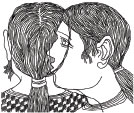Liang Hongfu
Free press must be impartial
By Hong Liang (China Daily)
Updated: 2007-01-30 07:35
 |
Large Medium Small |
Having been a reporter and sometime editor for more than two decades, I still can't understand what is meant by "editorial freedom", a term frequently cited by Hong Kong reporters in protest against management decisions to kill their stories.
 Of course, I have a fair idea what "freedom of the press" implies. Like most people in Hong Kong, I take for granted my "freedom of speech". But any notion I had for "editorial freedom" was snuffed out early in my career when my editor told me that his word on what went into the newspaper was final. He had the mandate from the owners of the newspaper to run it in accordance with a clearly defined set of principles.
Of course, I have a fair idea what "freedom of the press" implies. Like most people in Hong Kong, I take for granted my "freedom of speech". But any notion I had for "editorial freedom" was snuffed out early in my career when my editor told me that his word on what went into the newspaper was final. He had the mandate from the owners of the newspaper to run it in accordance with a clearly defined set of principles.
I was further told that any reporter who deemed those principles unacceptable could exercise his or her freedom to walk. We journalists are supposed to be professionals. In our world, there are only good stories and bad stories.
This simple principle touches the core of the controversy circling a public affairs television program on same-sex marriage produced by the government-funded Radio Television Hong Kong, or RTHK. In response to complaints after it was aired, the Broadcasting Authority, a government-sponsored watchdog agency, reviewed the program and ruled it to be "unfair, partial and biased toward homosexuality" because it failed to present the views of the opponents to same-sex marriage.
But the raging public debate has strayed from the merit, or demerit, of the program to the highly sensitive issue of press freedom. Instead of disputing the basis of the authority's ruling, the producer of the program was reported to have voiced concern about the threat to the so-called "editorial freedom".
Whatever concern this producer may have is now being magnified by some commentators who charged the government with trying to suppress public discussion of controversial issues. In a major local newspaper, a columnist argued against the application of the principles of fairness and impartiality "rigidly on the content of a single program". Doing so, he contends, could pose the "danger of putting unnecessary curbs on journalists' creative thinking, diversity and originality".
I cannot disagree with him more.
As journalists, we have all learned to live by the cardinal rule of fairness and impartiality that should apply to each and every story we write. It is simply wrong for a reporter, or a producer for that matter, to write about a person, company or issue without providing any contrary viewpoint. A one-sided report is usually called a "hype".
When doing company stories, we were always required by our editors to talk to competitors and suppliers for a balanced view. The rule of impartiality is particularly strict when applied to personality profiles. As one of my editors loved to say, everybody has enemies who can show you the hidden face of the subject.
Seen in this light, the RTHK program, produced with public money, should have been canned. Failing to do that has only shown up the laxity in program quality control within RTHK.
For that reason, members of the public have every right to demand swift and decisive action by the government to ensure that public money is being spent on producing programs of the highest editorial standard specified in the existing television code. Indeed, the government is entrusted by the public to enforce the code, which contains, among other things, a rule on impartiality.
Every news organization has its own code. A newspaper I used to work at has one of the strictest codes among all US media. And yet its reporters are well known in the industry for their creativity, originality and fearlessness in delving into the most controversial issues of the time.
(China Daily 01/30/2007 page10)
| 分享按钮 |